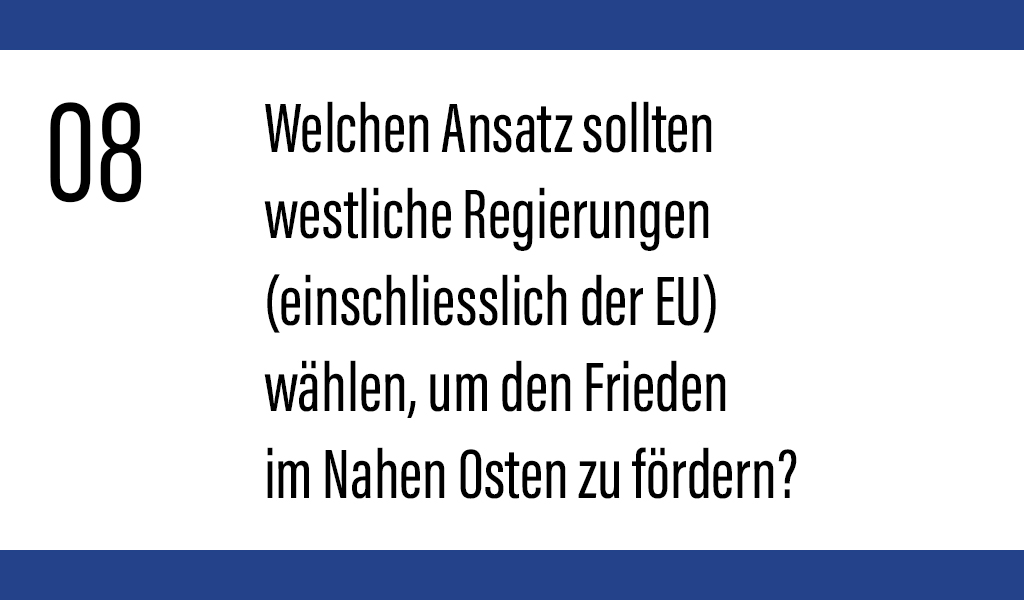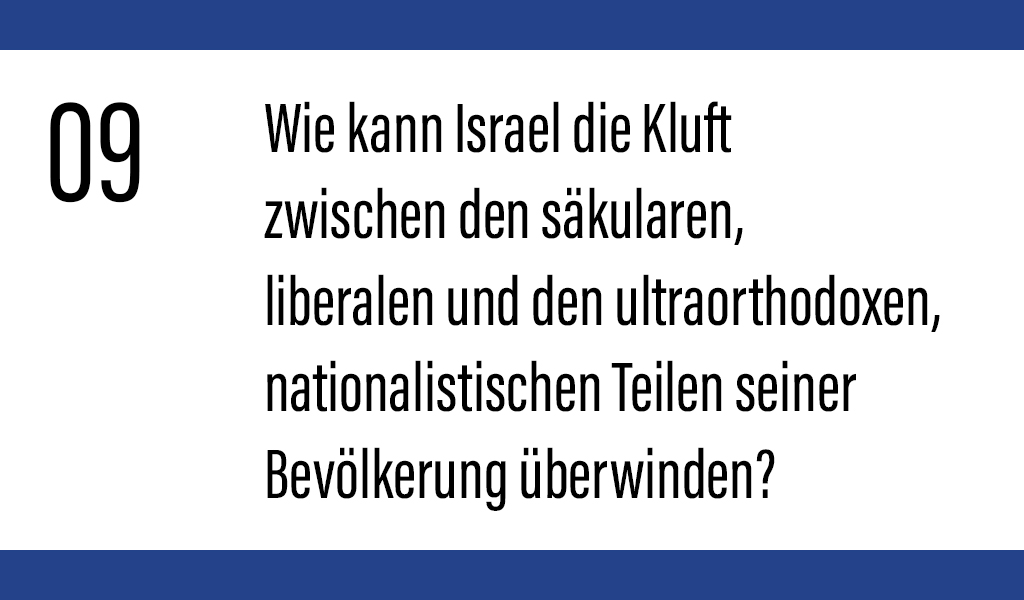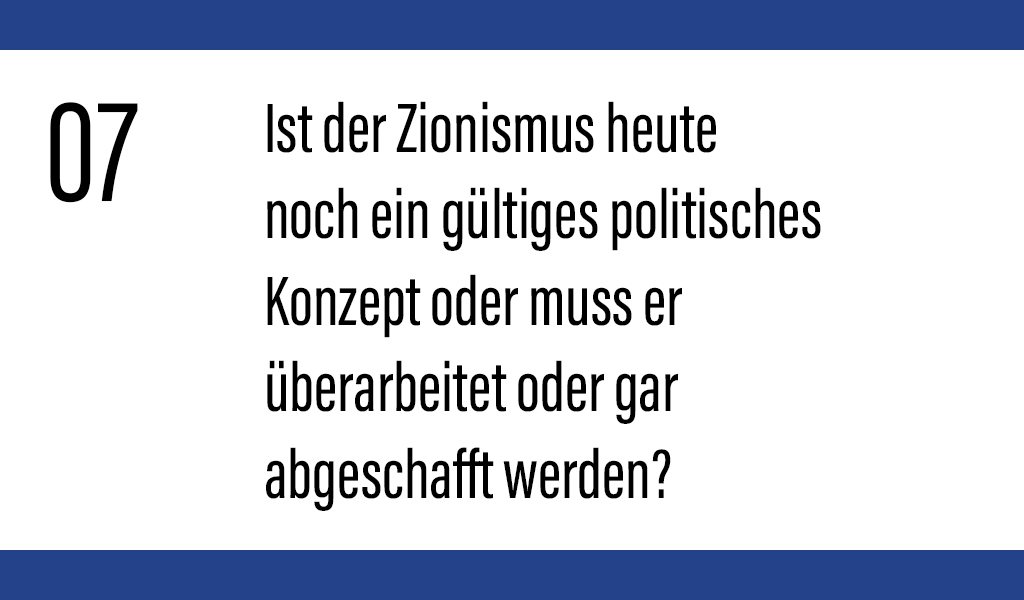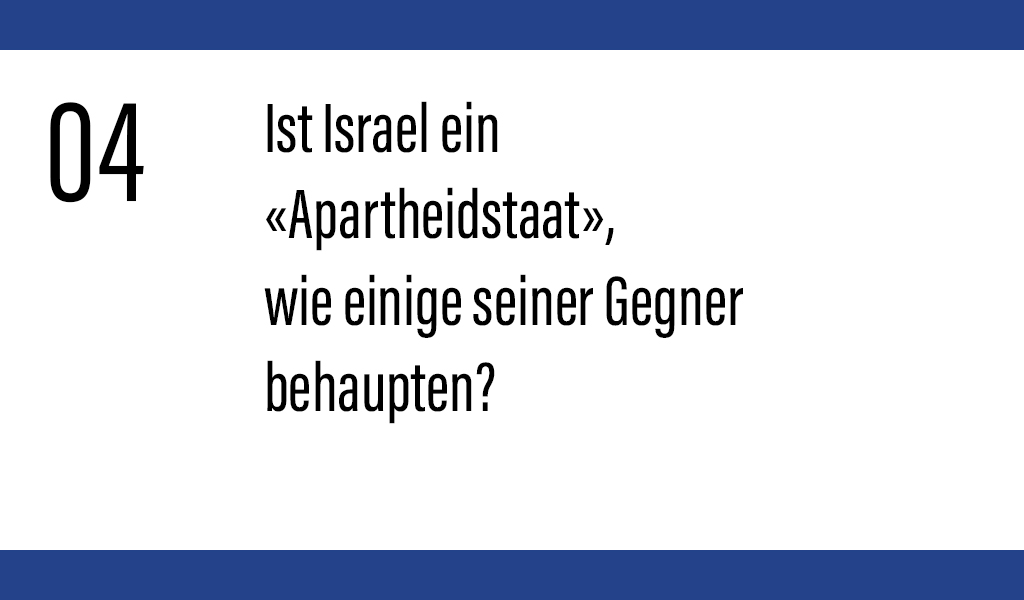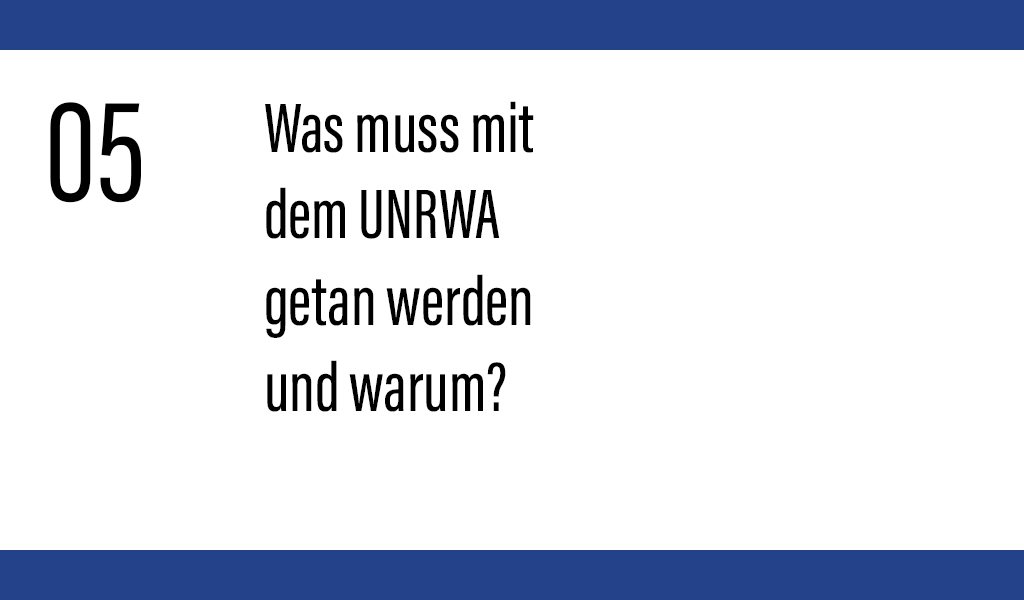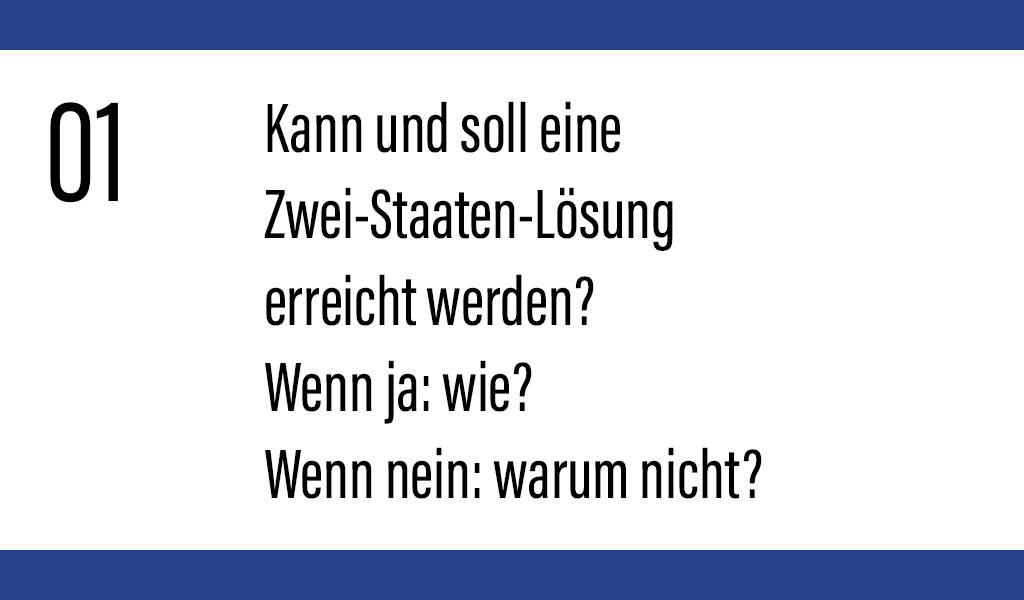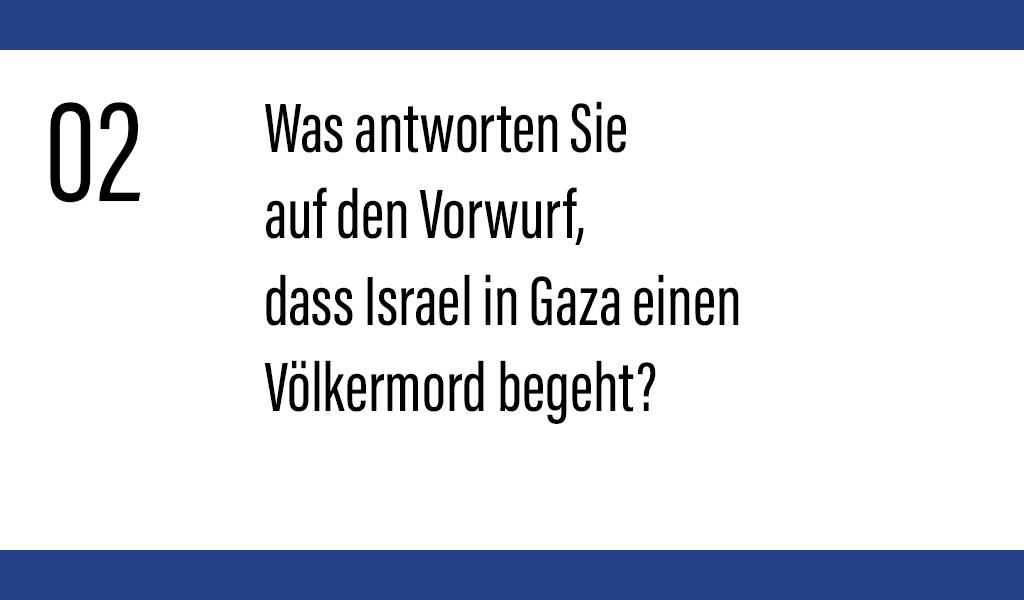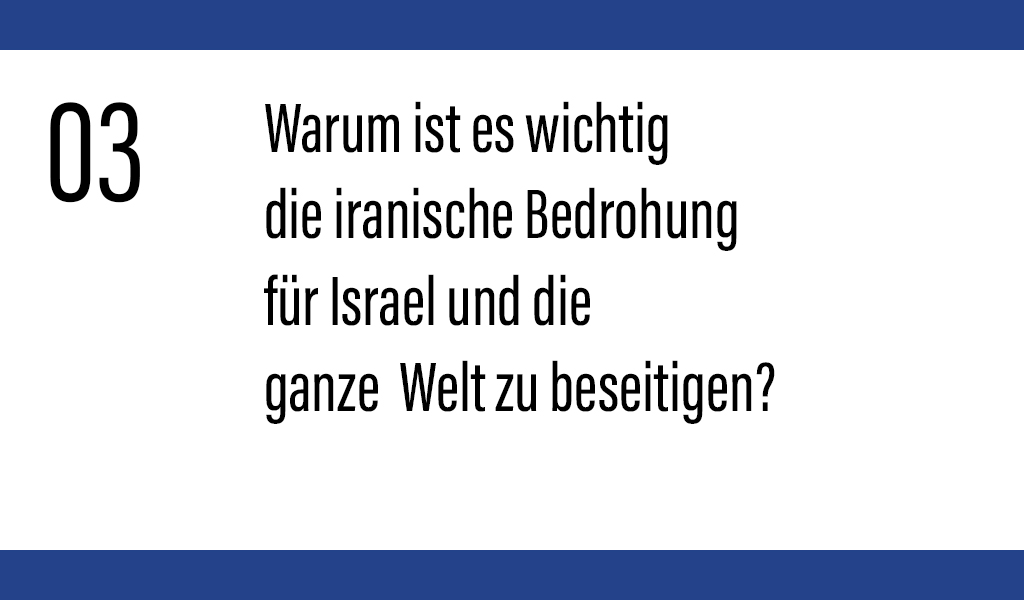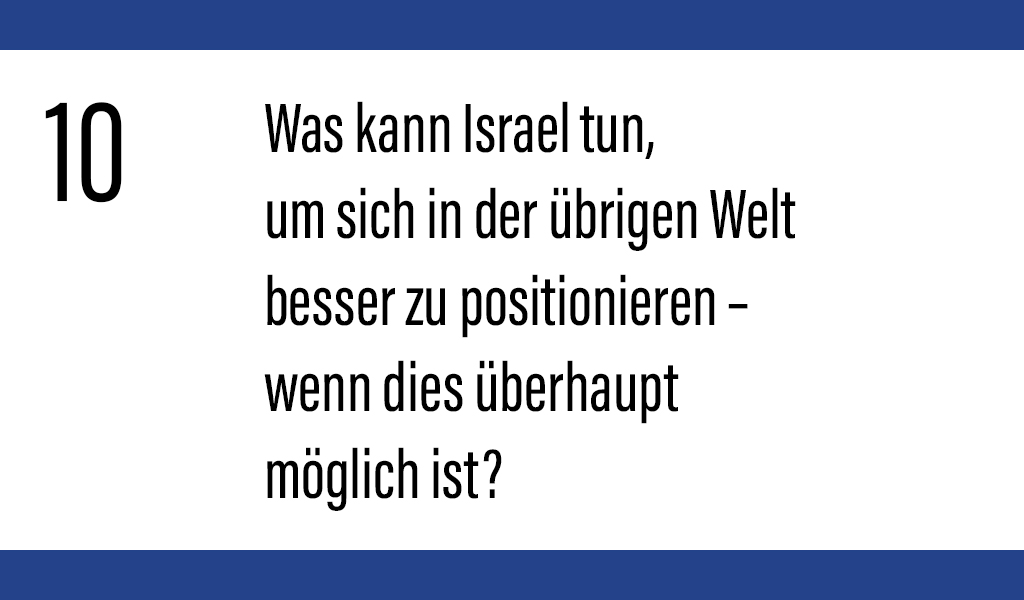Questions and answers on Israel, Gaza and the Palestinians
Questions and answers on the Iran and Gaza wars
Is Israel committing genocide in Gaza?
Is Israel a colonialist project and an apartheid state?
What is the UN Palestinian Refugee Agency (UNRWA) all about?
Why are there almost 6 million Palestinian refugees according to official statistics?
Read the answers here.
Question: Is Israel committing genocide in Gaza?
South Africa has called on the International Court of Justice (ICJ) to classify Israel’s actions in Gaza as “genocide”. Genocide is a core crime in international law. It refers to the deliberate murder, extermination or other destruction of ethnic groups on the basis of their ethnic or social characteristics, nationality or religious beliefs. It is true that individual ultra-nationalist politicians in Israel have called for Israel to annihilate the Palestinians in Gaza. But their demands have nothing in common with the actions of the political leadership and the army in Gaza.
Israel is concerned with the security of its own population and not – as is crucial in genocide – with the intention of destroying the Palestinians in whole or in part. Rather, Israel has repeatedly and clearly stated that its sole aim is to eliminate the terrorist organizations Hamas and Palestinian Islamic Jihad (PIJ) in Gaza and to free the hostages held by them on 7 October. Accordingly, it is the members of Hamas and Islamic Jihad and their military infrastructure that the IDF is targeting and not the Palestinian civilian population in Gaza. Rather, the IDF warns civilians in Gaza through various channels before attacking a target.
Worth listening to on the subject of genocide, SRF Echo der Zeit from 4.11.2023, interview with Oliver Diggelmann, Professor of International Law at the University of Zurich, from min. 3:30.
Question: Is Israel violating international law in Gaza?
International humanitarian law, which includes the Geneva Conventions, regulates in particular the protection of the civilian population in the event of war. Accordingly, attacks on the civilian population, as were common during the Second World War, are strictly prohibited. Civilian objects such as hospitals, residential buildings or schools may not be attacked. It is also forbidden to misuse civilians as shields for military targets or to direct the movements of the civilian population in such a way that they shield military targets from attacks or cover acts of war. So if a warring party such as Hamas uses a hospital as a weapons depot, for example, or if rockets are fired from a residential building, it is no longer a civilian object, even if there are still civilians in the building.
International humanitarian law also recognizes – as tragic as this is – victims among the civilian population as so-called collateral damage in an armed conflict. Collateral damage is not considered a war crime as long as the attacks are proportionate.
In Gaza, Israel’s war against the terrorist organizations Hamas and Palestinian Islamic Jihad is claiming thousands of lives among the civilian population. But unlike in the Second World War, these civilians are not the target of the attacks. In the Israeli army IDF, every rocket attack on Hamas targets has to be examined in advance by lawyers to determine whether or not the expected civilian casualties justify the attack.
Furthermore, in accordance with the Geneva Conventions, Israel warns the civilian population in Gaza of attacks on a specific area or road by sending messages and calls to cell phones and dropping leaflets. These warnings also include informing the population of specific routes (corridors) through which they can reach safety.
Question: Do we need the UN refugee agency UNWRA?
As the Swiss Foreign Minister, Federal Councillor Ignazio Cassis, stated in 2018, UNRWA is not the solution, but part of the problem between the Palestinians and Israel. Not only Cassis, but also the non-governmental organization UN Watch has been criticizing this for many years. But it is only now, after the New York Times and the Wall Street Journal, citing an Israeli intelligence dossier, made public the direct involvement of UNWRA employees in the massacre of October 7, that the flow of money has been stopped.
UN Watch has also documented in its report UNRWA’S TERRORGRAM how numerous UNWRA employees celebrated the terror of October 7.
UNWRA must and can be dissolved in the medium term. There is no reason why Palestinian refugees should not be cared for by the UN High Commissioner for Refugees (UNHCR) like all other refugees in the world. Since its foundation in 1950, the UNHCR has helped millions of refugees to build a new life.
In contrast, UNRWA keeps the problem of the so-called Palestinian refugees going and artificially increases the number of refugees. Since 1948, this number has risen from 750,000 to almost 6 million. This is solely because Palestinians, unlike other refugee groups, pass on their refugee status to the next generation – regardless of their actual situation.
What UNWRA does in the areas of education, health and humanitarian aid, as well as in all other areas, could just as easily be done by state or international institutions. In the area of education in particular, it is clear how politically infiltrated the organization is. In its 700 or so schools, it inculcates hatred of Israel and Jews in children and young people (see here or here).
Question: Is Israel a colonialist project of European Jews?
No, for several reasons.
Firstly, colonialism refers to the expansion of the power of European countries into non-European territories with the primary aim of economic exploitation. However, the European Jews who settled in historical Palestine were refugees, not colonists. Nor did they represent the interests of their countries of origin. The first Zionists arrived in historical Palestine as early as 1882. At that time, Jews made up the majority of the population in Jerusalem. In 1914, between 90,000 and 100,000 Jews lived in the region.
Secondly, the Jews have always been at home in the region. The beginning of Jewish history in this area can be dated to around 1300 BC, while the Arabic language and culture only spread from the Arabian Peninsula to the then Christian, Byzantine Palestine in the 7th century AD with the emergence of Islam. This means that those Jews who immigrated to Palestine in the 19th and 20th centuries, where their ancestors had lived, were not colonialists but returnees for this reason too.
Thirdly, at least half of the Jewish population of today’s Israel are so-called Mizrahim Jews. They are not European, but their families were expelled from Arab countries before and immediately after the founding of Israel. The journalist Lyn Julius, co-founder of Harif, an association of Jews from the Middle East and North Africa in Great Britain, has described this in detail in her book “Uprooted”.
It is also often forgotten that most Palestinian Arabs are descendants of immigrants from other countries who came to the region after 1882. This is shown in the report Land Ownership in Palestine, 1880-1948, which states that there was a large wave of immigration between the two world wars, not least because the Jewish population had successfully cultivated desert and swamp areas in the sparsely populated land and thus provided work. The first Jewish farming settlement was founded in Petach-Tikva (Gate of Hope) in 1878.
Question: Is Israel an apartheid state?
Apartheid is defined under international criminal law, including the 1974 Anti-Apartheid Convention (Article 2) and the 1998 Rome Statute of the International Criminal Court (Article 7(2)(j)), as a crime against humanity consisting of three elements:
1. the intention of one ethnic group to dominate another;
2. the systematic oppression of the dominant group against the marginalized group; and
3. particularly serious violations in the form of inhumane treatment.
None of these elements apply to Israel. Israel is a democracy. All Israelis have the same rights, regardless of origin, ethnicity, gender or sexual orientation. (This is in contrast to the rights enjoyed by people in Gaza and surrounding neighboring countries, where, for example, homosexuality is not tolerated and women’s rights are severely restricted). Israel is a constitutional state with a functioning separation of powers. Freedom of opinion and freedom of the press are guaranteed.
Over a fifth of Israelis are Arab. Arab Israelis are represented in the Knesset, the Israeli parliament. The United Arab List (Ra’am) was the first Arab party to make it into government in 2021, representing an Islamist, anti-Zionist policy.
Since 2022, Khaled Kabub has been the first Muslim-Arab Israeli to serve on the Supreme Court, as well as other Christian-Arab Israelis. From 2017 to 2023, Esther Hayut was the third woman to preside over the Supreme Court. Like the judicial institutions of other democracies, the Supreme Court protects the rule of law and individual rights. However, because Israel does not have a written constitution or basic law, the court system in Israel has a particularly important role to play. The Supreme Court repeatedly criticizes Israeli politics with its rulings. At the beginning of 2024, it overturned the core element of the so-called judicial reform, with which Prime Minister Benjamin Netanyahu and his right-wing nationalist-religious cabinet allies threatened to undermine the separation of powers. Prior to this, hundreds of thousands of Israelis had taken to the streets for months to protest against the reform.
Arab Israelis are also generally well integrated in many parts of society. In medicine, for example. According to data from the Ministry of Health for 2020, Arab Israelis made up 46 percent of newly trained doctors, and even 50 percent of nurses (in 2000 it was just nine percent). More than half of dentists (53 percent) and as many as 57 percent of pharmacists are Arab Israelis.
The situation in Gaza and the West Bank has nothing to do with apartheid either:
In 2005, Israel withdrew completely from Gaza. However, since Hamas came to power in 2007, Israel has been constantly confronted with attacks and rocket attacks from Gaza. For security reasons, Israel sealed off the border to Gaza, as Egypt has also done.
Two years ago, Israel began to ease the blockade and granted more and more Palestinians permission to work in Israel. In the end, over 18,000 of them commuted across the border to work every day. A mistake, as we know today. Many of them came to spy on their employers and the situation on the ground. The gruesome massacre of October 7 was planned long in advance.
The Palestinian Authority under Mahmoud Abbas of Fatah has ruled the West Bank since 2006 – and not the Israeli government.
However, Israel’s settlement policy in the West Bank is rightly criticized as illegal – both in Israel itself and abroad. This policy is making it increasingly difficult to achieve a two-state solution, as agreed by the UN in 1947. But even this has nothing to do with apartheid.
Question: How many Palestinians are on the run?
The vast majority of Palestinians are not refugees, even though 5.9 million Palestinian refugees are registered with UNRWA today. This is because the Palestinians are the only group of refugees in the world whose descendants are also considered refugees. This means that, contrary to the Geneva Refugee Convention, the Palestinians are the only ones to inherit their refugee status. In 1948, around 750,000 Arabs fled or left the region or sold their land. This happened in the course of the Israeli War of Independence, during which the armies of Syria, Jordan, Egypt, Lebanon and Iraq wanted to destroy the newly founded Israeli state.
Of these 750,000 Arabs, 50,000 to 70,000 are still alive today, depending on estimates. They are genuine refugees within the meaning of the UN Refugee Convention. However, their descendants, i.e. the remaining 5.8 million Palestinians who claim this status, are not.
Download questions and answers on Israel, Gaza and the Palestinians as PDF


